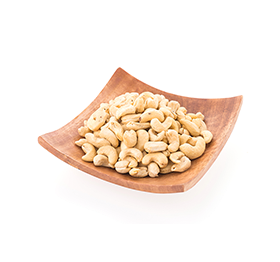Cashew Nut (काजू)
kaajoo

About Cashew Nut
Cashews, type of nut kidney shaped with sweet in taste sourced from cashew tree. used to make dairy alternatives like milk, cheese, cream and etc also rich in Oil; are actually edible seeds. Mainly cultivated in Brazil and India. Cashews is known for its culinary uses, Cashews is also used for stomach and intestinal ailments. Cashews are also associated with weight loss, improved blood sugar control. Overall Cashews are rich in healthy fats, protein, fibre, vitamins, minerals and beneficial plant compounds. Cashews are rich in magnesium, pantothenic acid, Vitamin B2, B3, B6, K. While buying Cashews in bulk, ensure that they are not rancid.
- Cashews are Rich in nutrients. (Specially unsaturated fats)
- Powerful antioxidant (polyphenols and carotenoid )
- Might help in losing weight
- Might help people with type 2 diabetes.
- Cashews can improve metabolism
- Cashew Nut Oil is useful removing Corns (Skin callus/ thick skin)
- Good Source of Dietary fibre
Avoid Cashews if you have allergy from hazelnut, pistachio etc. Also eating in excess can increase the risk of Diabetes.
In Indian Ayurveda, cashew nuts are valued for their nutritional benefits and their ability to balance the body's doshas, particularly Vata and Pitta. Rich in healthy fats, protein, and minerals, they are believed to support heart health, enhance vitality, and improve digestion.
Cashew nuts are also used in home remedies. For instance, they can be ground into a paste and applied to the skin to soothe irritations or consumed to boost energy and strength during convalescence. Their incorporation into a balanced diet is encouraged for overall well-being.
How to Store Cashew Nut
To store cashew nuts effectively, first, ensure they are completely cool if roasted. Then, place them in an airtight container to prevent exposure to air and moisture. Choose a cool, dry location away from direct sunlight, such as a pantry or cupboard. For longer shelf life, consider refrigerating or freezing the container, which can help maintain freshness for up to two years. Always label the container with the date of storage. When ready to use, allow them to come to room temperature before opening the container to avoid condensation.
Shelf Life of Cashew Nut
The shelf life of cashew nuts is about 6 to 12 months when stored in an airtight container in a cool, dry place. Refrigeration can extend freshness to up to 2 years. Always check for signs of spoilage.
How to Check Cashew Nut Before Buying
When checking cashew nuts before buying from a local vendor, examine the nuts closely. Look for whole, unbroken pieces with a uniform, light beige color. Avoid nuts that are discolored, have dark spots, or show signs of mold, as these indicate spoilage. Fresh cashew nuts should smell nutty and slightly sweet, not rancid or sour. If possible, taste a sample to assess their flavor and texture; they should be crunchy and not overly oily.
Procuring cashew nuts in bulk can be beneficial if you frequently use them, as it often reduces costs. However, ensure you have suitable storage conditions, such as airtight containers in a cool, dry place, to maintain their freshness. Check the packaging date to ensure you’re purchasing a recent batch, and plan to consume them within the recommended shelf life to avoid spoilage.
Explore
Explore our services and take your business to the next level.
Recent Posts

Kanji is a delicious and nutritious dish that can effortlessly fit into your wee...

Savor the warmth of Palak Dal Khichdi, a nourishing and comforting dish that bea...

Kuttu and Potato Tikki is a wholesome, gluten-free snack that blends the earthy...

Bajra Veggie Tikki is the perfect addition to your weekly meal plan, offering a...

Corn Cutlet is the perfect way to spice up your weekly meal plan, offering a del...
Ready for a Healthier You?
Take control of your wellness! Get a customized meal plan that fits your lifestyle. It's time to eat smarter, feel better, and transform your life!
Get Your Plan Now!Already a member? Login and start now!
Nutrition Facts
Serving Size:
Servings Per Container: 1
| Amount Per Serving | ||
|---|---|---|
| Calories | 582 | |
| Fat | ||
| Saturated Fat | ||
| Trans Fat | ||
| Cholesterol | 0 | |
| Sodium | 9 | |
| Carbs | 25.46 | |
| Fiber | ||
| Sugar | 3 | |
| Protein | 18 | |
| VitaminD | ||
| Calcium | 34 | |
| Iron | 5.95 | |
| Potassium | 635 | |
* Percent Daily Values are based on a 2000 calorie diet.
* Percent Daily Values are based on a 2000 calorie diet.

